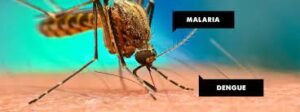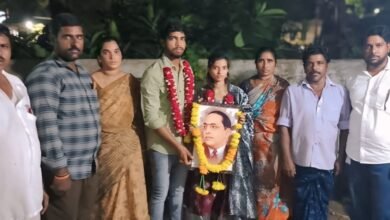Dengue and Malaria Fears Rise Amid Heavy Rains in Andhra Pradesh. !!!
Doruvupaul Jagan Babu : Bureau Chief-South.

Andhra Pradesh :- Recent heavy rains in many parts of Andhra Pradesh have provided much-needed relief to areas suffering from severe heat conditions. However, the downpours have also raised alarms among health professionals about the potential increase in mosquito-borne diseases such as dengue and malaria.
Water stagnation left behind by these rains creates ideal breeding grounds for mosquitoes, exacerbating the risk of these diseases.

In Bengaluru, the situation is particularly dire. The heavy rainfall has led to extensive water logging in many parts of the city, creating a significant public health challenge. Reports indicate that dengue fever is spreading rapidly across Bengaluru and the entire state of Karnataka.
The data is concerning: from January to last week, there have been 2,877 reported cases of dengue in Karnataka. This figure is significantly higher than the 1,725 cases recorded during the same period last year.

The rise in dengue cases has prompted the Karnataka Health Department to take action. On National Dengue Day, observed on May 16, the department implemented special measures aimed at curbing the spread of the disease and raising public awareness about preventive strategies.
The efforts include educational campaigns to inform the public about the importance of preventing mosquito breeding in and around their homes.
Dengue fever, which is transmitted by the Aedes mosquito, typically presents symptoms within three to 14 days after a mosquito bite. These symptoms can range from mild to severe and include high fever, severe headache, pain behind the eyes, joint and muscle pain, rash, and mild bleeding (such as nose or gum bleed). Early detection and treatment of dengue can significantly reduce the severity of the disease and prevent complications.

Health officials emphasize that preventing dengue is a collective responsibility. They urge the public to take proactive steps to eliminate potential mosquito breeding sites by ensuring that water does not accumulate in household items such as flower pots and buckets. Regularly using mosquito repellents and nets, are also effective preventive measures.

The AP state’s health department is also focusing on community-level interventions. These include fogging operations to kill adult mosquitoes, and supplying dengue diagnostic kits to primary health centers to enable dengue testing at the village level. Public health campaigns through various media channels aim to educate citizensm about the importance of hygiene and sanitation in preventing mosquito-borne diseases.
The situation in Karnataka serves as a stark reminder of the broader public health challenges posed by heavy rainfall and inadequate drainage systems.
While the recent rains in Andhra Pradesh have brought much-needed respite from drought conditions, they have also underscored the urgent need for effective measures to combat mosquito-borne diseases.

Doctors caution that although the rains bring joy to farmers, they also increase the risk of disease outbreaks. Public cooperation, combined with health department initiatives, is crucial in controlling the spread of dengue and ensuring the well-being of communities across the region.








